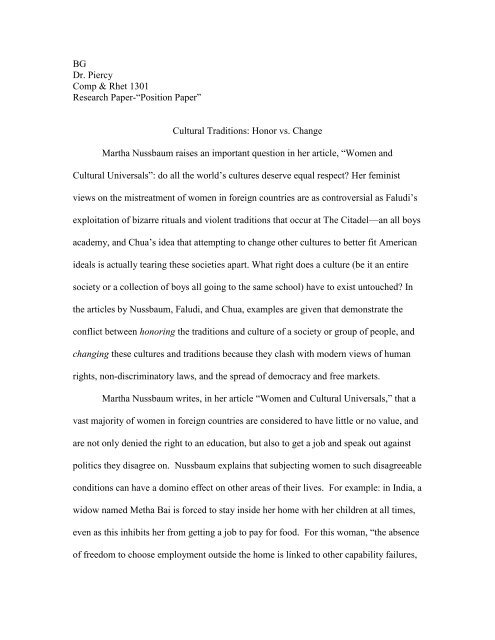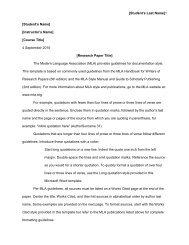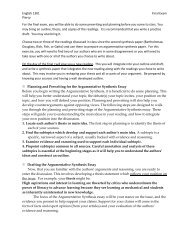Sample synthesis paper 2
Sample synthesis paper 2
Sample synthesis paper 2
- No tags were found...
You also want an ePaper? Increase the reach of your titles
YUMPU automatically turns print PDFs into web optimized ePapers that Google loves.
BGDr. PiercyComp & Rhet 1301Research Paper-“Position Paper”Cultural Traditions: Honor vs. ChangeMartha Nussbaum raises an important question in her article, “Women andCultural Universals”: do all the world‟s cultures deserve equal respect? Her feministviews on the mistreatment of women in foreign countries are as controversial as Faludi‟sexploitation of bizarre rituals and violent traditions that occur at The Citadel—an all boysacademy, and Chua‟s idea that attempting to change other cultures to better fit Americanideals is actually tearing these societies apart. What right does a culture (be it an entiresociety or a collection of boys all going to the same school) have to exist untouched? Inthe articles by Nussbaum, Faludi, and Chua, examples are given that demonstrate theconflict between honoring the traditions and culture of a society or group of people, andchanging these cultures and traditions because they clash with modern views of humanrights, non-discriminatory laws, and the spread of democracy and free markets.Martha Nussbaum writes, in her article “Women and Cultural Universals,” that avast majority of women in foreign countries are considered to have little or no value, andare not only denied the right to an education, but also to get a job and speak out againstpolitics they disagree on. Nussbaum explains that subjecting women to such disagreeableconditions can have a domino effect on other areas of their lives. For example: in India, awidow named Metha Bai is forced to stay inside her home with her children at all times,even as this inhibits her from getting a job to pay for food. For this woman, “the absenceof freedom to choose employment outside the home is linked to other capability failures,
in the areas of health, nutrition, mobility, education, and political voice” (Nussbaum377). Nussbaum also introduced a list of “Central Human Functional Capabilities,”which she explained should be applied to every culture, and guaranteed for every humanbeing. A few examples of her necessary functions are “being able to live to the end of ahuman life of normal length, being able to have good health,” and “being able to laughplay, and enjoy recreational activities” (Nussbaum 373). But critics argue, claiming thatthis list of human rights might apply to a woman from the United States, but not to awoman from India. Roberto Gargarella, a professor of philosophy in Buenos Aires, statesNussbaum does not offer sufficient support for her claims that her account of thecapability approach applies to all women. Nussbaum's background country perspective,from the United States, is not representative of all Western countries; and in the sameway, the main subjects of her assessment of women's lives, Indian women, are notrepresentative of all women. The conclusions of the book are standard of any defense ofliberal egalitarianism. In conclusion, the list of basic human capabilities presented in thisbook appears less the product of a dialogical reflection—"the result of years of crossculturaldiscussion"--but rather of a monological reflection, framed in similar terms toany other liberal egalitarian philosopher (IDEA 4). Should her list of necessary functionsbe applied to all societies, no matter their religion or culture? Would it even be possibleto make a significant change and better the lives of women in intolerant countries? SusanFaludi demonstrates that it is possible to bring change to even the most obstinate cultures,as The Citadel accepted its controversial first female recruit, though at a great price.Susan Faludi‟s “The Naked Citadel” begins with a description of why the malecadets of the Citadel think their masculine traditions should be honored and kept
“sacred”, and ends with their small sub-culture being stripped of everything they hadbeen fighting against—as the first female cadet in Citadel history was enrolled.According to Faulkner, the tradition of an all-male student body at a state-funded schoolwas one tradition that did not deserve to be honored. She sued the Citadel on the basisthat single-sex education at a state-funded school is discriminatory and unconstitutional(CNN.com 2). Faludi digs deeper, investigating exactly why the male cadets were soenraged by the admission of a woman into their military academy, and was curious as towhat the cadets could possible say that would justify the existence of this tradition.What she found was not pleasant: violent hazing rituals, evasive Citadel administrators,and extreme racial and homosexual prejudices. When interviewing cadets, they allseemed to project the same belief: “[women] will have a deleterious effect on the Corpsof Cadets” (Faludi 145). An unhappy ex-cadet, Pat Conroy, mused that “the Citadeltaught me the exact kind of man I didn‟t want to be,” (Faludi 142) and a black woman tograduate from the Citadel years later has said “the freshman year thing was horrible…Iwas called all kinds of [names,] you name it" (Brown 9). It wasn‟t long before she foundone of the main reasons for the cadets making life at the Citadel seem so unappealing towomen: the preservation of the all-male communal bathroom. The cadets seemed tobelieve that sharing stall-less showers and toilets is “at the heart of the Citadelexperience”. “I know it sounds trivial, but all of us in one shower, its like we‟re all one,we‟re all the same, and—I don‟t know—you feel like you‟re exposed, but you‟re safe,”offers one cadet (Faludi 134). Obviously the views of the cadets should be honored--nomatter how bizarre they seem, but because their anti-female enrollment policies are trulyunconstitutional, this is one cultural boundary that had to be crossed.
describes in his book, Globalization and Its Discontents. “A growing divide between thehave and have-nots has left increasing numbers in the Third World in dire poverty, livingoff less than a dollar a day” (Stiglitz 5). The actual number of people living in poverty inthe last decade has increased by almost 100 million, while the total world incomeincreased by an average of 2.5 annually (Stiglitz 4). Suicide bombers in Israel, genitalmutilation in Jakarta, and the murders of Chinese in the Philippians are just a fewexamples of how unhappy these countries are with the spread of globalization to theirareas. Though globalization has its benefits, these people are screaming to have theircultural traditions and ways of life honored. McDonalds and Hollywood cannot be thrustupon these countries without severe repercussions.In all of these articles, a choice must be maid: honor the traditions and culture of asociety, or mold and change it into what someone else views as more perfect, moreeconomic, or more socially acceptable?













